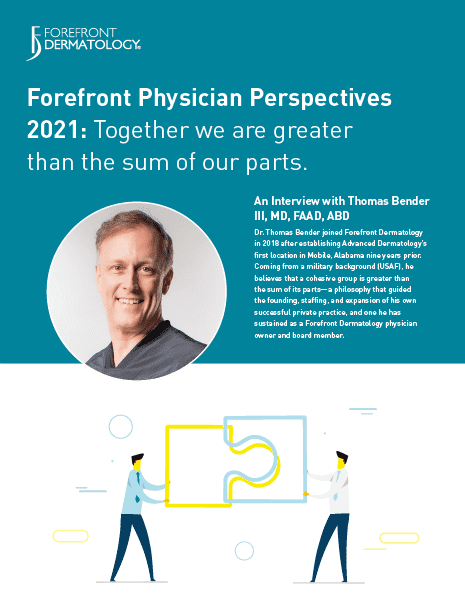Navigating the Transition
Even though we knew we were a strong cultural match, there’s always going to be some anxiety around change. Forefront’s onboarding process was such a relief in that respect. Having done this dozens of times before, they really have it down to a science. Everybody in my practice was impressed—they came in and set up at one of the local hotels, splitting us up into staff members and providers so they could explain exactly what the benefit structures were, how you sign up for things, all of the details we needed to make the transition as efficiently and painlessly as possible.
The onboarding team was knowledgeable and efficient, certainly, but what stood out to me most was how they focused on making my group feel comfortable with the transition. It wasn’t some big, bad, ugly corporation coming in with people in black suits everywhere. It was more like, “We’re a family, you guys are a family. Both families are going to get a little bit bigger, so we’re here to see how we can help with that.”
That’s only one aspect of the transition, of course. Another is the switch from making unilateral decisions in your practice to being a part of a larger group, which is a challenging concept for some practice founders. I actually did not find it difficult. I really felt the opportunity— and not only opportunity, the invitation—to influence the overall group practice. There are definitely things that Forefront does better that we’ve incorporated into Advanced Dermatology. But there are also things we’d been doing pretty well that Forefront was interested in incorporating. And I think that’s when you know it’s a true partnership.
Physician Leadership
My experience running for Forefront’s physician board is another great example of that two-way partnership—and of their commitment to physician leadership overall. At the first shareholder meeting I went to after I joined, our four board-certified dermatologist leaders encouraged me to throw my hat in the ring for a spot on the board.
So here’s this new dermatologist from, at that point in time, the southernmost practice in Forefront, being allowed to join this longstanding group of leaders. In many practices—probably most!—they would have wanted to keep the decision-making power concentrated. But they thought, “Hey, if we’re going to keep growing in the Southeast, then we need to have some representation on the board from that area of the country.” That interest in diverse geographical representation speaks highly of the integrity of the group. And for my part, it’s been really gratifying to visit with dermatologists from Wisconsin, Michigan, Kentucky… Working through challenges is so much more productive when we consider different perspectives to arrive at the right decision.
COVID-19: A Test of Leadership
Nowhere was that diverse expertise more important than in crafting our initial COVID-19 response.
When you have over one hundred and eighty physicians across eighteen states—and more than a few with master’s degrees in public health—you have a lot of solid, well-grounded professional opinions about how to proceed during a pandemic. Forefront’s physician-led COVID-19 Taskforce, which was established at the very outset of the pandemic, took in those opinions along with the relevant research to come up with the most rational, best-informed plan for our operations going forward.
I’m proud of what we produced in the Taskforce. I see our collaboration from a personal angle, too. It would have been so much harder—intellectually and financially—to deal with something like this on my own without Forefront’s peer input and resources. The pandemic was in Michigan and Wisconsin before it was in Alabama, so we had early warning and early expertise from partners in those states about how to provide top-notch dermatological care while keeping our staff and our patients safe.
“Forefront figured that out right away. We needed to be prepared, we needed to protect patients, we needed to protect our staff, but we also needed to be available for our patients.”
Balancing Safety with Access
Part of that early guidance was that we needed to empty our lobbies so patients couldn’t pass the virus to each other. Another important protocol was that everyone had to wear N-95 masks so that we could diagnosis and treat patients, especially our most vulnerable, without exposing them or us to the disease. Forefront’s supply chain made it possible for us to get those masks very early on, allowing us to provide access to our patients.
In my view, we had—and have—a professional duty to make our patients feel comfortable so they don’t postpone or cancel much-needed checkups or treatment. We don’t want a melanoma to go undiagnosed because people are scared that they aren’t safe in our offices. Forefront figured that out right away. We needed to be prepared, we needed to protect patients, we needed to protect our staff, but we also needed to be available for our patients. Triaging dermatologic patients on the phone is just not adequate.
The Mission Behind the Care
Early on in the pandemic, physicians across the country were considering offering only emergency dermatologic care. Partly because I’m healthy and relatively young, and partly because of my military training, not being available for patients was never really an option for me. Forefront’s Taskforce and physician board collaborated to make sure everyone had the information and supplies to take care of our patients. Our weekly zoom meetings provided the science and speed to ensure there was uninterrupted care for our patients who needed us most. And although Forefront never mandated anything to its physicians, the Taskforce gave clear information about best-practice safety measures and protocols. From my perspective, the result was that we all felt prepared and protected.
Meanwhile, Forefront’s administrative staff stayed on top of ever-changing local and federal directives as well as CDC guidelines. They also analyzed and managed CARES Act funding and other financial resources. All of their work meant that I could focus on patient care— and crucially, so could my staff. Because of Forefront’s quickness and transparency, I was able to tell my staff what the plan was going to be and that they would be protected so we could fulfill our mission of care.
The Benefits of Integration: Costs
That mission of care has costs, of course. How do you pay for all the N-95 masks you need? For all the gloves? In the first six months of the pandemic, costs went through the roof with all the new supplies we needed. I saw firsthand the massive benefits of integration.
Before Forefront I had a large practice of more than ten providers, and I thought I was getting a great deal on cosmetic supplies and other items like sutures.
I wasn’t getting quite the deal I thought I was! But you’d expect that. A practice with three hundred providers should have better pricing than one with ten.
Here’s another example: having in-house training available when you’re launching a new Electronic Medical Record system. If a practice tried to do that themselves, they’d have to pay for the system but also shell out thousands of dollars for a two-day training crash course. With Forefront, we had something like ten people stay with us for two weeks, answering questions as they arose and helping us get comfortable with the system.
“The more first-rate dermatologists we can partner with—those whose top priority is patient care—the more we can speak as a collective voice on behalf of our patients, our staff, and our specialty.”
Leveraging our Resources
When I was building my practice, I didn’t want patients to have a reason to go anywhere else. I wanted them to come to us to receive the best, comprehensive care for their skin. I also never wanted patients to feel like I was pushing them in a certain direction because that’s the equipment or procedure we had: I wanted to have all the options at hand so that they could make an informed decision about the right care for them.
I think the importance of that mix applies just as well to Forefront overall. Given the constant churn of reimbursement reform, fluctuating patient demand, and even something as unpredictable as a pandemic, it’s just sensible to invest in multiple service lines.
Forefront’s laboratory is an ideal model in this respect: we have eight or nine highly trained, highly collaborative specialists working only for us. They’re all wonderful people. And they do a fantastic job—there’s absolutely no medical reason not to trust them with our patients’ care.
Tackling Misinformation
When folks consider partnering with another group— whether that’s a private equity-backed group or some other entity—they’re naturally concerned about maintaining their autonomy. But here’s what I’ve noticed. Many of the nightmare scenarios I’ve heard have come from people outside of these partnerships. And a lot of that misinformation, in the media and especially in dermatologist journals, comes from folks who really have a conflict of interest. Referral-based dermatopathologists and Mohs surgeons are unlikely to support consolidation because they’re afraid they may lose patients. So they try to discourage folks from joining together. And one of the first things that they’ll say is that you’ll lose your autonomy.
At Forefront, at least, that couldn’t be further from the truth. No one here has ever told me or any of our providers how to take care of a patient. When we partner with a practice, we’re partnering with them because we like what they’re already doing. The reason we’d even entertain a partnership is that they’re a strong practice with the right values, and they take good care of their patients. Why would we undermine that?
The Broader Landscape
The way I see it, consolidation does not threaten our autonomy; it sustains it.
Our specialty faces major external pressures from insurance companies and other people telling us how we can treat a patient in the exam room. At Forefront, we look to dermatologists to do what’s right for patients. If there’s a conflict of interest in terms of financial motivation, it certainly isn’t with dermatologists.
The more first-rate dermatologists we can partner with—those whose top priority is patient care—the more we can speak as a collective voice on behalf of our patients, our staff, and our specialty. That’s what consolidation is really about.
Let’s Talk
To learn more about Dr. Bender or discuss with him how Forefront Dermatology could be the right partner for you, visit: www.advanceddermclinic.com or email him at [email protected]

